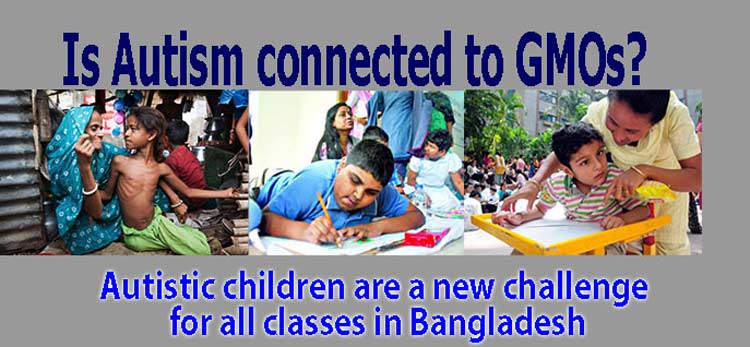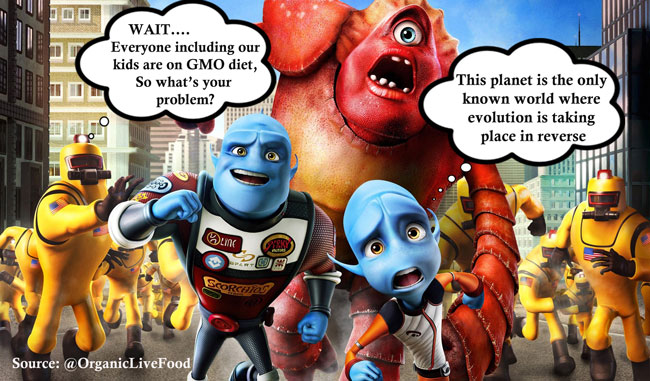Autistic babies and connection with GM soybean sdf
 M.A. Sobhan || Friday 11 October 2013 ||
M.A. Sobhan || Friday 11 October 2013 ||
There are evidence of connection between the birth of autistic babies and the GM soybean. Autism is a life- long developmental disability that manifests itself during the first three years of life. A diagnosis of autism can be one of the most devastating diagnoses a parent can hear. At worst, children diagnosed with autism will never be able to function as a normal human being in society.
Cause of Autism
There are several factors researchers have looked at in attempting to uncover the cause of autism. These include genetics and infections. One of the possible causes of autism is the Bt (Bacillus thuringiensis) toxin found in transgenic corn and cottonseed.
Study conducted with human reported undigested DNA from GM Roundup herbicide resistant soybean inside the intestine of study patients. The DNA of Bt toxin found in the bloodstream of women and foetuses may indicate that it may also remain in the guts upon consumption. This in turn may be producing a “human pesticide factory” in the guts leading to leaky gut syndrome. The leaky gut syndrome from the Bt toxin and a blood brain barrier in foetuses may be causing deleterious cognitive and immune dysfunction in the young. This toxin might be causing the increase in autism.
What are some of the other clues that GM food might be causing the increase in Autism? The increase in Autism began only after the introduction of GM organisms into US food supply. Autism rates increased dramatically in the mid to late 1990’s. The increased autism rates coincide perfectly with the introduction of GM food. The rate of chronic health conditions among children in the United States increased from 12.8% in 1994 to 26.6% in 2006.

Another clue might come from comparing Autism rates in countries that do not consume, ban or label GM food and those that consume them freely. Finding statistics on the prevalence of Autism in other countries is difficult. But it is no secret that the United States has the higher rate of Autism in the world and is also the leading producer and consumer of GM crops. It is also one of the industrial countries that do not label the GM ingredients in food so that consumers unsuspectingly eat them. A 2009 comparison of the prevalence of Autism in different countries showed Autism in France was 4 times lower than the US, Iceland rates were found to be 7 times lower and Denmark, another country with mandatory labelling requirements, had 14 times lower Autism rate than the US. Thus it appears that the countries that label, limit or ban GMO’s have lower rates of Autism.
GM Labelling
Bangladesh like the United States and Canada do not require labelling of genetically engineered foods. Currently 64 countries around the world require labelling of genetically engineered foods. Below is a list of countries that require labelling: (1) Australia, (2) Austria, (3) Belarus, (4) Belgium, (5) Bolivia, (6) Bosnia and Herzegovina, (7) Brazil, (8) Bulgaria, (9) Cameroon, (10) China, (11) Croatia, (12) Cyprus, (13) Czech Republic, (14) Denmark, (15) Ecuador, (16) EL Salvador, (17) Estonia, (18) Ethiopia, (19) Finland, (20) France, (21) Germany, (22) Greece, (23) Hungary, (24) Iceland, (25) India, (26) Indonesia, (27) Ireland, (28) Italy, (29) Japan, (30) Jordan, (31) Kazakhstan, (32) Kenya, (33) Latvia, (34) Lithonia, (35) Luxemburg, (36) Malaysia, (37) Mali, (38) Malta, (39) Mauritius, (40) Netherlands, (41) New Zealand, (42) Norway, (43) Peru, (44) Poland, (45) Portugal, (46) Romania, (47) Russia, (48) Saudi Arabia, (49) Senegal, (50) Slovakia, (51) Slovenia, (52) South Africa, (53) South Korea, (54) Spain, (55) Sri Lanka, (56) Sweden, (57) Switzerland, (58) Taiwan, (59) Thailand, (60) Tunisia, (61) Turkey, (62) Ukraine, (63) United Kingdom and (64) Vietnam.
Frequency of Autism in Bangladesh:
Recently there has been a rising trend of autism in Bangladesh since the import of soy bean from Argentina and Brazil for diversified edible purposes. It is learnt that out of every 94 boys, one is affected by Autism; for girls, it is one in 150. It is assumed that about 300,000 children are affected by autism in Bangladesh.
Changing prevalence of autism
- 1 in 2500 (1980’s and before)
- 1 in 166 (late 1990s)
- 1 in 150 (early 2000s)
- 1 in 110 (mid 2000s)
Cause of Autism in Bangladesh
Genetically modified soybean oil and soy food may be the main cause of rising trend of autism in Bangladesh like that of the United States of America.
Soybean oil is the preferred cooking medium in Bangladesh. Each year approximately 500,000 MT of soybean is imported by the people of Bangladesh (out of a total of edible oil consumption of 1.4 million MT).
Almost all of this soybean oil is imported from Brazil and Argentina (Bangladesh Soybean Association, 2012). Argentina (98%), Brazil (64%) and the USA (85%) produce almost exclusively GM soybeans.
Soybean producers and government officials in the USA and Argentina do not see a reason to keep GM and conventionally bred cultivars separate-whether during harvest, shipment, storage or processing. Soybean imports from these countries generally contain a high amount of GM content.
GM soybean can lead to Hormonal Disruption and Miscarriages. The active ingredient in Round up herbicide is called glyphosate, which is responsible for the disruption of delicate hormonal balance of the female reproductive cycle. It is an endocrine buster that interferes with aromatase, which produces estrogen. Glyphosate is toxic to the placenta which is responsible for developing vital nutrients from the mother to child and eliminating waste products. Once the placenta has been damaged, the result can be miscarriage. In those children born to mothers who have been exposed to even a small amount of glyphosate serious birth defects can result. .
Conclusion
We currently consume GM soybean oil, but do not know what is there in it. We have a right to know what is in our food. GMOs have not been proven safe. The long term health risks of GM food need to be investigated. The entry of GM food and crops in the country should be resisted in the interest of public health, biological diversity and environment. The faster we wake up to these problems, the quicker we will get the truth out and save our children
Recommendation
Dependence on imported soybean oil should be reduced .The existing cropping patterns need to be revised. The cultivation of traditional oil seed crops like mustard, sesame, ground- nut, etc. should be extended. Non-G M soybean seed from China and other sources may be introduced, tried and extended for cultivation. Sunflower and safflower cultivation may also be extended.
... ... ...
Dr.M.A. Sobhan, is Consultant to Agricultural Research Programmes of UBINIG. He is Ex-Chief Scientific Officer of Bangladesh Jute Research Institute.